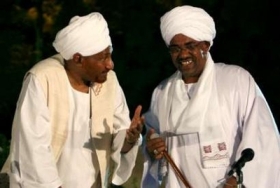Sudan former PM accuses NCP ruling party of “exclusion” policies
September 19, 2008 (KHARTOUM) – Former Sudanese Prime Minister and leader of the opposition Umma party Sadiq al-Mahdi lashed out the ruling National Congress Party (NCP) accusing it of excluding all other social and political powers.

“This caused a recreation of closed areas that are gaining the support of secular figures in the North” he said.
“The NCP policies are the strictest and most rigid in considering that Sudan has an Arab-Islamic identity” Al-Mahdi added.
The opposition leader said that while he is committed to his Arab-Islamic identity “we must respect the equal citizenship and freedom of religion “.
Last May the Umma party and NCP signed an agreement last week better known as “National Reconciliation Agreement” which largely outlines a number of fundamental principles that both sides share the same views on.
The agreement was criticized by other opposition parties and even members of the Umma party.
However Al-Mahdi brushed off the criticism saying that the agreement “protects the right of other political parties and all issues can be raised in a nation conference”.
An Umma party figure speaking to Sudan Tribune on condition of anonymity said that Al-Mahdi is frustrated by the government’s lack of seriousness on implementing the agreement.
“We must work for a broad Sudan as an alternative to the exclusionist NCP and the counter reaction to that” the Umma party chief said.
Tensions in Sudan have heightened since the prosecutor of the International Criminal Court (ICC) announced in mid-July that he is seeking an arrest warrant for Sudanese president Omer Hassan Al-Bashir.
Al-Mahdi voiced support to the Sudanese president despite his earlier support to the work of the ICC in Darfur. Some political analysts have suggested that opposition parties are trying to get concessions out of the NCP in lights of these developments which made the ruling party more vulnerable.
(ST)
